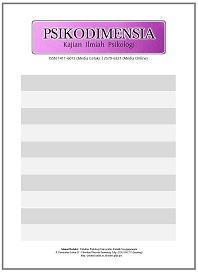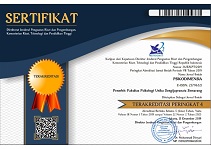Sibling Rivalry in 2-4 Years Old Children: Maternal Management Based on Emotion Coaching Concept
Abstract
Keywords
Full Text:
PDFReferences
Benaroya, M. (2012). Emotion coaching: An essential part of your parenting toolbox. Diunduh pada tanggal 4 Februari 2017 dari http://westseattlepreschoolassociation.com/wp-content/uploads/2011/03/West-Seattle-Preschool-Association-Emotion-Coaching-Handout-3-19-2012.pdf
Essa, E. L. (2011). Introduction to early childhood education (6th edition). Belmont: Cengage Learning
Haritz, U. (2008). Mengelola persaingan kakak adik. Solo: Indiva Media Kreasi
Howe, N., Karos, L. K., & Aquan‐Assee, J. (2011). Sibling relationship quality in early adolescence: Child and maternal perceptions and daily interactions. Infant and Child Development, 20(2), 227-245.
Kolak, A. M., & Volling B. L. (2011). Sibling jealousy in early childhood: Longitudinal links to sibling relationship quality. Infant and Child Development, 20, 213-226.
Lestari, S. (2012). Psikologi keluarga: penanaman nilai dan penanganan konflik dalam keluarga. Jakarta: Kencana.
Parke, R. D. & Stewart, A. C. (2014). Social development. USA: John Wiley & Sons Inc.
Rejeki, S., Samiasih, A., & Astuti, T. (2012). Pengetahuan ibu dan reaksi sibling rivalry pada anak usia pra sekolah (3-5 tahun) di komuniti Indonesia mesaieed qatar. Fakultas Keperawatan dan Kesehatan Universitas Muhammadiyah Semarang: Perawat RS Qatar.
Santrock, J. W. (2013). Life span development (14th edition). New York: Mc Graw Hill.
Volling, B. L., Kennedy, D. E., & Jackey, L., M., H. (2010). The development of sibling jealousy. Dalam Hart, S., L. dan Legerstee, M., Handbook of jealousy. USA: Wiley Blackwell.
Whiteman, S.D., McHale, S. M., & Soli, A. (2011). Theoretical perspectives on sibling relationships. Journal of family theory & review, 3(2), 124-139.
Wolke, D., Tippett, N., & Dantchev, S. (2015). Bullying in the family: sibling bullying. The Lancet Psychiatry, 2(10), 917–929.
DOI: https://doi.org/10.24167/psidim.v19i1.2070
Print ISSN : 1411-6073 | online ISSN : 2579-6321 View My Stats

This work is licensed under a Creative Commons Attribution 4.0 International License.




















